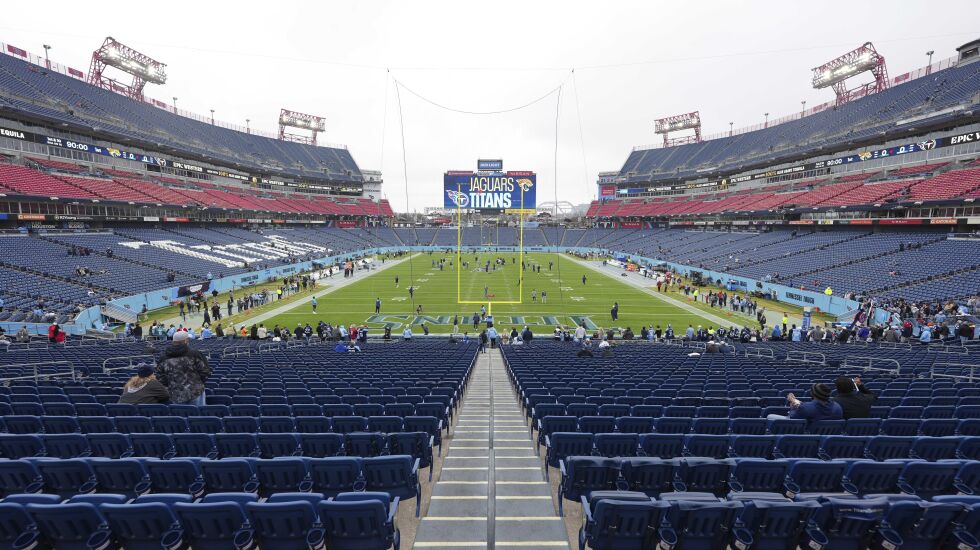
NASHVILLE, Tenn. — The Tennessee Titans have the final financing piece for the NFL’s next pricey stadium with the largest public investment yet that they hope to open for the 2027 season.
The Metro Nashville City Council finally approved by a 26-12 vote early Wednesday morning on the final reading to allow its sports authority to issue $760 million in bonds. That combines with $500 million in state bonds for $1.2 billion in public financing committed to the Titans’ enclosed stadium.
That gives Tennessee the largest public price tag for a stadium, topping the $850 million commitment from New York for Buffalo’s new $1.5 billion stadium.
The stadium’s total cost is estimated at $2.1 billion. The Titans, with help from the NFL and personal seat licenses, will provide the remaining $840 million. Controlling owner Amy Adams Strunk thanked everyone involved as the Titans start on a new chapter.
“For more than 25 years, Nashville, Tennessee, has been the Titans’ home, and with the approval of the new stadium agreement, we are grateful to know the Titans will be a part of this great city and state for decades to come,” Strunk said in a statement.
The council meeting began Tuesday night with two hours apiece for taxpayers to argue for and against the proposal to use Nashville’s bonding authority to pay for a second stadium for the privately-owned NFL team. The council took about six hours before a final vote.
The new stadium will feature a translucent roof with a capacity of approximately 60,000.
This stadium will allow Nashville and the Titans to bid for a Super Bowl, NCAA Final Fours, College Football Playoff games and more. Burke Nihill, the Titans’ president and CEO, said they are excited at the chance to host some of the world’s best events.
“This is a generational opportunity to address our city’s priorities and ensure its health and vitality for the next 30 years,” Nihill said. “Our city and our state have bright futures ahead, and we’re humbled by the opportunity to continue to be a part of it.”
The deal shifts an estimated $1.8 billion in costs for future maintenance and stadium investments up to 2039 from Nashville taxpayers to the NFL franchise, which also will be on the hook for costs that go over budget and maintenance instead of local taxpayers.
In the deal, the Titans agreed to waive $32 million owed by Nashville for money spent maintaining Nissan Stadium the past four years. The Titans also will pay off the remaining $30 million in bonds owed for the current stadium.
A new 1% hotel/motel tax, all of in-stadium sales tax and 50% of sales taxes from 130 acres around the stadium will pay off the bonds. The Titans and city officials announced an agreement in December that includes a new 30-year lease. The team also agreed not to leave Nashville during that lease.
Nashville hired an independent consulting firm that confirmed the Titans’ estimate of what the city would pay to maintain the stadium under the lease signed in 1996. Venue Solutions Group agreed that renovating the current stadium would cost between $1.75 billion and $1.95 billion over the remaining years on the lease.
The Titans have been clearing money for their portion of the stadium with team officials hoping to break ground by mid 2024 to open for the 2027 season. Strunk already paid for the expansion of the team’s headquarters that essentially doubled the size of the building that opened in August 1999.
Nissan Stadium originally opened in 1999 as Adelphia Coliseum. That deal cost $292 million convincing franchise founder Bud Adams, who died in 2013, to move his Oilers from Houston to Tennessee in 1997.
The Titans originally planned to renovate that stadium until a study doubled the original estimated costs of $600 million to $1.2 billion.
The new stadium will be built on the parking lots between the current stadium and Interstate 24. The deal returns control of 66 acres, including the current site of Nissan Stadium, to Nashville. City officials are planning a renovation featuring to feature a park, greenways, affordable housing and a new road.
Nashville already hosted the 2019 NFL Draft, drawing approximately 600,000 people over three days.







